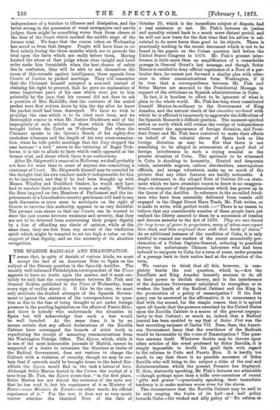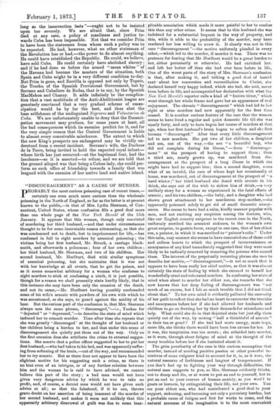THE SPANISH RADICALS AND EMANCIPATION.
IT seems that, in spite of denials of various kinds, we must accept the fact of an American Note to Spain on the subject of the Slavery question in the Spanish Antilles. The usually well-informed Philadelphia correspondent of the Times appears to have no doubt upon the matter, and it must cer- tainly be said that the correspondence between Mr. Fish and General Sickles, published in the Times of Wednesday, bears every sign of reality about it. If this be the case, we must only attribute the studied attempts of the Spanish Govern- ment to ignore the existence of the correspondence in ques- tion as due to the fear of being thought to act under foreign pressure in the pending legislation on the affairs of Puerto Rico ; and there is nobody who understands the situation in Spain but will acknowledge that such a fear would be• well founded. At the same time, it is by no means certain that any official declarations of the Zorrilla Cabinet have outstepped the bounds of strict truth in repudiating the receipt of menacing communications from the Washington Foreign Office. The Epoca, which, while it is one of the most honourable journals of Madrid, cannot be suspected of a desire to extenuate the blunders or faults of the Radical Government, does not venture to charge the Cabinet with a violation of veracity, though we may be cer- tain that if untruth could be brought home to the hated Zor- rillists, the Epoca would find in the task a labour of love. Although Senor Martos denied in the Cortes the receipt of a note from Mr. Fish, the Epoca states that, " in the first place, Senor Martos has not denied the existence of the note, nor that he has read it, but his cognisance of it as Minister of State—como Ministro de Estado—in other words, his official cognisance of it." For the rest, it does not so very much matter whether the identical Note of the date of October 29, which is the immediate subject of dispute, had a real existence or not. Mr. Fish's lectures on justice and morality extend back to a much more distant period, and he will not now learn for the first time that his advice is cal- culated to do more harm than good to its objects. There is practically nothing in the recent document which is not to be found in the papers on the Cuban question laid before the United States Congress in 1870. Mr. Fish's present inter- ference is little more than an amplification of a remarkable passage in General Grant's last message, and though Senor Martos is enabled to deny official cognizance of a Note of a par- ticular date, he cannot put forward a similar plea with refer- ence to other communications from Washington, if it be true that a correspondence between Mr. Fish and Senor Martos are annexed to the Presidential Message in support of the criticisms on Spanish administration in Cuba.
In fact, it is bootless to affect to be ignorant of what is plain to the whole world. Mr. Fish has long since constituted himself Mentor-in-ordinary to the Government of King Amadeo, and the natural result of the cacoethes scribendi with which he is afflicted is immensely to aggravate the difficulties of the Spanish Monarch's difficult position. The meanest-spirited nation on earth which still retains the vestige of independence would resent the appearance of foreign dictation, and Presi- dent Grant and Mr. Fish have contrived to make their efforts on behalf of the colonial slaves of Spain look as like foreign dictation as may be. Not that there is not something to be alleged in extenuation of a good deal of foreign interference in such a crying scandal as the present situation of Cuba. The spectacle to be witnessed in Cuba is shocking to humanity. Hunted and desperate rebels, miserable negroes, callous slaveholders, unscrupulous officials, and savage volunteers, make up so much of the picture that any other features are hardly noticeable. A single statement in the alleged Note of October 29—a state- ment which we have abundant reason to know is no exaggera- tion—is eloquent of the pandemonium which has grown up in the Queen of the Antilles. In reference to the so-called freed- men who have been ostensibly delivered from vessels still engaged in the illegal Direct Slave Trade, Mr. Fish writes, or is made to write, with perfect truth :—" There is no reason to believe that any considerable number of these people have yet realised the liberty assured to them by a succession of treaties and decrees anterior to the Act of 1870. They are now leased for long terms of years to proprietors, many of whom soon report them dead, and then confound them with their herds of slaves." As an additional instance of the condition of Cuba, it is only needful to remind our readers of the recent scoundrelly pro- clamation of a Cuban Captain-General, reducing to practical slavery the unfortunate Chinese labourers who had been induced to emigrate to Cuba for a term of years, under promise of a passage back to their native land at the expiration of the term.
We venture to think that all this, however, is com- pletely beside the real question, which is,—Are the Zorrillists and King Amadeo honestly anxious to do all in their power to abolish slavery, and is the interference of the American Government calculated to strengthen or to weaken the hands of the Radical Cabinet and the King in
the prosecution of a policy of emancipation ? If the first query can be answered in the affirmative, it is unnecessary to
deal with the second, for the simple reason that it is agreed
upon all hands that the pressure exercised by the United States upon the Zorrilla Cabinet is a source of the gravest unpopu-
larity to that Cabinet ; so much so, indeed, that a Radical journal has been enabled to say that el Senor Fish was the best recruiting-serjeant of Carlos VII. Does, then, the Ameri- can Government fancy that the overthrow of the Radicals would be favourable to the cause of Emancipation ? The ques- tion answers itself. Whatever doubts may be thrown upon other articles of the creed professed by Senor Zorrilla, it is simply impossible to doubt his good faith with regard to the reforms in Cuba and Puerto Rico. It is hardly too much to say that there is no possible successor of Senor Zorrilla who will bring to the subject a tithe of the zeal and disinterestedness which the present Premier has displayed.
If, then, abstractly speaking, Mr. Fish's lectures are admirable —though perhaps more than a trifle over-conscious of recent "gifts and graces "—practically speaking, their immediate tendency is to make matters worse even for the slaves.
The circumstance that the Zorrilla Cabinet may be said to be only reaping the fruits of its half - and - half policy towards Cuba—the wicked and silly policy of "No reform so long as the insurrection lasts "—ought not to be insisted upon too severely. We are afraid that, since Prim died at any rate, a policy of manliness and jastice to- wards Cuba has been impossible. Not that we consider Prim to have been the statesman from whom such a policy was to be expected. He had, however, what no other statesman of the Revolution has or had,—the power to do almost anything. He could have established the Republic. He could, we believe, have sold Cuba. He could certainly have abolished slavery ; and if he had done so before the armed "mean whites" of the Havana had become the masters of the situation, both Spain and Cuba might be in a very different condition to-day. But Prim is gone, and Zorrilla is opposed not only by Topete, the Trochu of the Spanish Provisional Government, but by Serrano and Caballero de Rodas, that is to say, by the Spanish MacMahon and Chanzy. It adds infinitely to the complica- tion that a vast multitude of the Anti-Abolitionist league are genuinely convinced that a very gradual scheme of eman- cipation would be by far the best, and thus abet the base selfishness of the undisguised Negreros and Voluntarios de Cuba. We are unfortunately unable to deny that the Emanci- pation movement may produce, for some years at least, all the bad consequences which its enemies predict for it, and for the very simple reason that the Central Government is liable to almost every conceivable mischance. The extent to which the new King's prospects are endangered may be vividly un- derstood from a recent incident. Serrano's wife, the Duchess de la Torre, being invited to hold the expected royal infant— whose birth has just occurred—at the baptismal font, had the insolence—so it is asserted—to refuse, and we are told that the ground alleged was that being a Cuban lady, she could per- form no such office of friendship towards a family that was leagued with the enemies of her native land and native island.







































 Previous page
Previous page